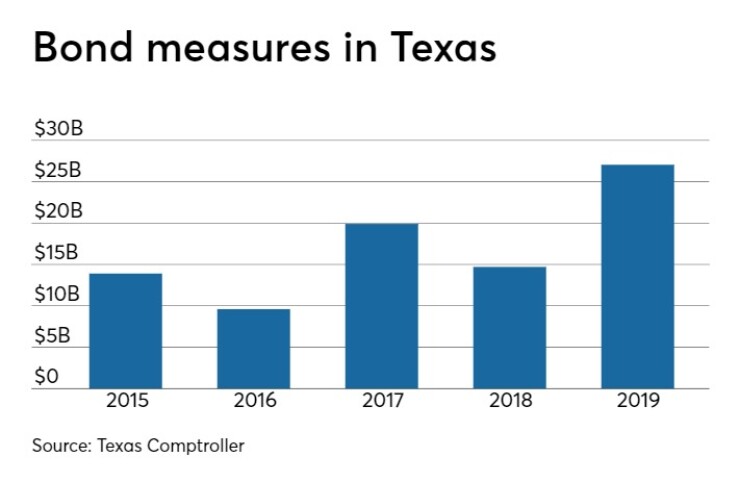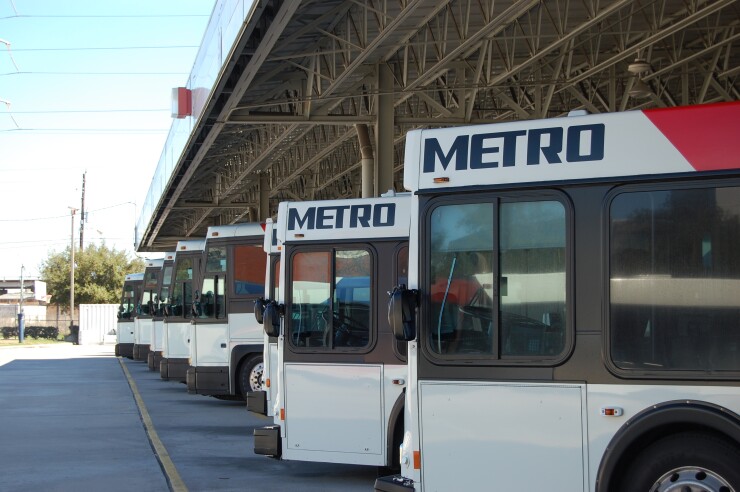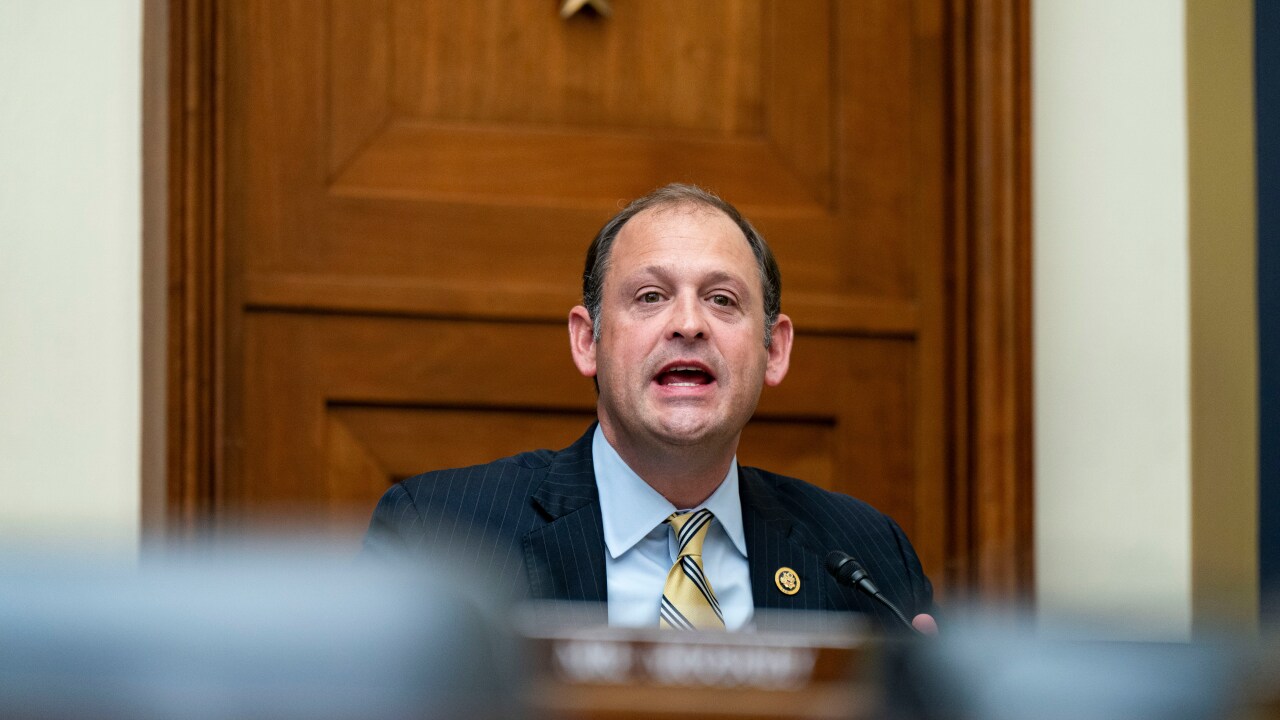Texas voters will decide a record $15.85 billion of state and local bond proposals on Nov. 5 while choosing leaders of cities, counties and schools.
The total, which includes $3 billion of bonds for the Cancer Prevention Research Institute of Texas, represents a 42% increase over last May’s record $11.2 billion of proposals and nearly double the $8.7 billion the amount on November 2018 ballots. About 84% of proposals on last May’s ballots won voter approval.

The largest single proposal next week is the Metropolitan Transit Authority of Harris County’s $3.5 billion bond request to expand rapid transit in the state’s largest county.
A
"The city has changed. It's a population that is much more heavily dependent on" public transit, Rice political science professor Bob Stein, who conducted the poll, told the Texas Tribune. "It's a taste and preference in a rising portion of the population that says, 'We don’t want a car.'"
Bond proceeds would fund 75 miles of rapid bus service, 16 miles of light rail and $600 million for improved bus stops and sidewalks.
Metro has not held a bond election since 2003 when it won approval of $600 million of bonds.
The Greater Houston Partnership’s Transportation Advisory Committee's chair Mark Cover called the plan fiscally responsible, offering the adaptability for future technologies like autonomous vehicles and was generally feasible to implement.
"The METRONext plan directs our transit plans between now and 2040. It is critical that we get this right, and I think we are on a good path,” Cover said in a statement.
Statewide, voters will decide whether to endow the Cancer Prevention Research Institute of Texas with another $3 billion of bond authority. Despite controversy over awards to politically connected recipients in the early days, CPRIT has worked to restore its credibility in a state that boasts some of the nation's leading cancer research and treatment centers.
Promoted by then-Gov. Rick Perry, CPRIT was created in 2009 after voters approved Proposition 15 in 2007. That measure authorized the state to issue $3 billion in bonds for the institute's operations, making grants for researching the causes of cancer and cures, mitigation, and developing cures, mitigation procedures, and prevention protocols and services.
Statewide voters will also consider $200 million of bond authority for the Texas Water Development Board’s Economically Distressed Areas Program that finances water and sewer projects in economically distressed areas.
With $6.87 billion of bond proposals, 52 school districts account for the largest proportion of issues, followed by 10 cities with $847 million, one community college district — Tarrant — with $825 million, and five counties with $713 million.
The school district volume is about 18% lower than last May’s, with no proposal topping $1 billion.
Arlington Independent School District in the Mid-Cities between Dallas and Fort Worth in North Texas tops the school ballots with a $966 million proposal. The record request comes five years after voters approved $663 million, leaving the district with about $1 billion of debt with underlying ratings of Aa1 from Moody’s Investors Service and AA from S&P Global Ratings.
The bond request follows a legislative session that increased state investment in public school districts, relieving some pressure on local property taxes.
“Texas school districts benefit from strong population trends and private-sector investment, driving economic growth and increasing taxable values,” Moody’s said in a recent report on Arlington ISD.
Because of its location in Tarrant County, which includes Fort Worth, Arlington ISD’s debt service overlaps with Tarrant County Community College District, which is seeking a record $825 million of bonds.
The community college district is debt-free and has not held a bond election in 25 years.
In Houston’s northern suburbs, Conroe ISD is requesting $653.6 million for new schools, renovations and additions, technology, transportation, and land purchase. Separately, the district is asking for $23.8 million for athletics. In past bond elections, some school districts have seen entire proposals fail when football stadiums were included in the bond package.

In Kaufman County on the fringe of suburban Dallas, the Forney Independent School District is seeking a record $623 million bond issue while the county is proposing $154 million of bonds for road projects.
In the Permian Basin oil producing region of West Texas, the Midland ISD is asking voters to approve $569 million of bonds as drilling operations begin to slacken amid weakening oil prices.
Midland ISD’s last facilities bond was in 2012, and it says the funded projects were completed on time, on target, and on budget. Money from the 2012 bond built three new elementary schools, and upgraded school safety, security, and technology on every elementary school campus. The 2019 bond will address capacity, school safety, security, and technology needs at the secondary level and support academic transformation throughout the district, officials said.
Among the largest proposals from cities is El Paso’s $413 million for streets and public safety facilities. El Paso City Council had considered seeking as much as $1 billion, but pared that back, with emphasis on public safety needs, especially in the growing eastern neighborhoods.
El Paso's bond overlaps with a $425 million proposal from the Ysleta ISD, which serves some parts of the city.
The city of Denton, north of Dallas and Fort Worth, is seeking $221 million in four proposals covering streets, parks and other public facilities.
Among counties, the largest proposal comes from Williamson County in Austin’s northern suburbs, where $447 billion of bonds are on the ballot for roads and parks.
In Houston, Mayor Sylvester Turner's re-election bid faces challenges from millionaire and businessman Tony Buzbee, former councilwoman Sue Lovell, councilman Dwight Boykins and lawyer Bill King, along with seven lesser-known candidates.
Turner, who steered Houston through major pension reform for police and firefighters, is a former state lawmaker who was elected mayor in 2015. If no candidate receives more than 50% of the vote, the top two finishers will participate in a runoff election on Dec. 14.
Also on the Houston ballot are all 16 city council seats and the city controller's office.
Four out of nine seats on the Houston Independent School District will also be decided as the school board faces the possibility of being replaced by a state-appointed board of managers. If appointed, the board of managers would assume the responsibilities of the elected board, while elected trustees would not have any power until they were reinstated. As of the 2018-2019 school year, HISD was the largest school district in Texas and the seventh-largest school district in the United States, serving 209,772 students in 280 schools with a budget of $2.04 billion.





